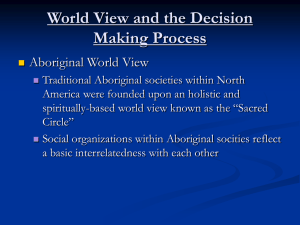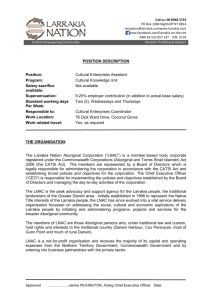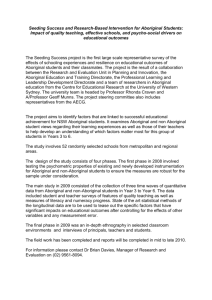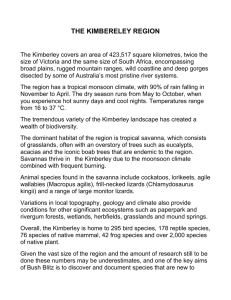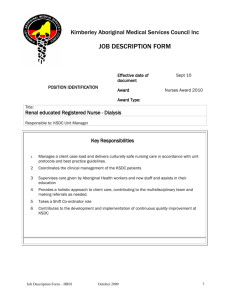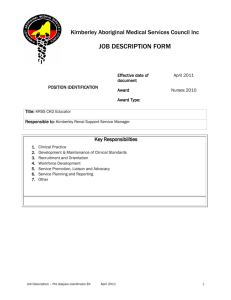296_mg_services - Indigenous Jobs and Training Review
advertisement
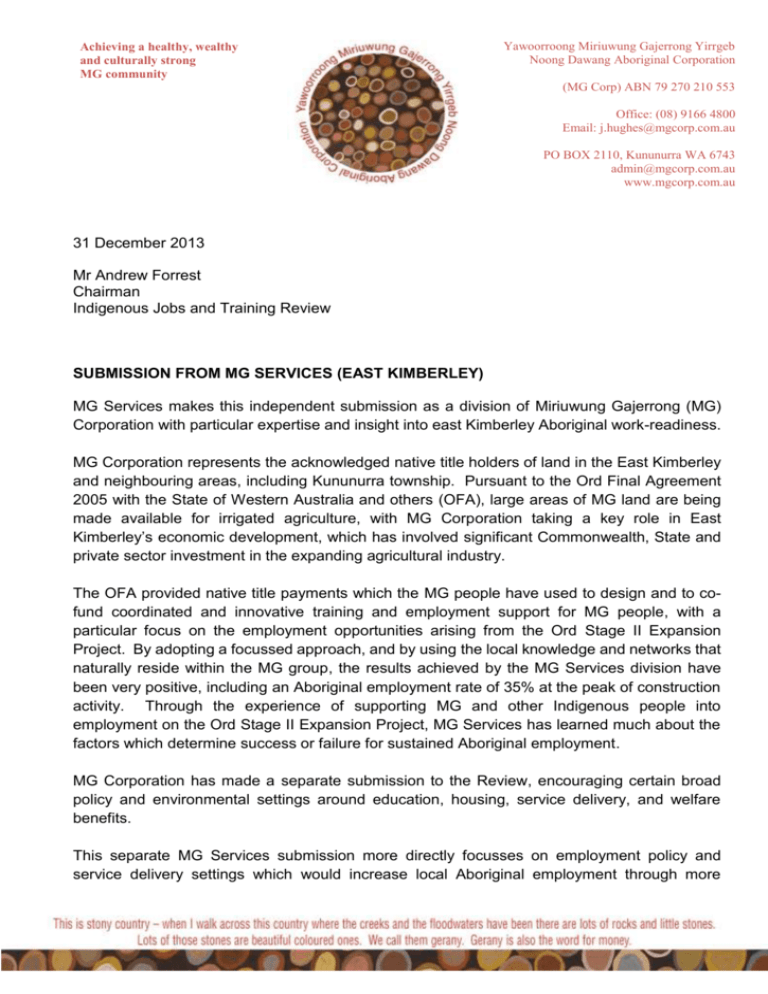
Achieving a healthy, wealthy and culturally strong MG community Yawoorroong Miriuwung Gajerrong Yirrgeb Noong Dawang Aboriginal Corporation (MG Corp) ABN 79 270 210 553 Office: (08) 9166 4800 Email: j.hughes@mgcorp.com.au PO BOX 2110, Kununurra WA 6743 admin@mgcorp.com.au www.mgcorp.com.au 31 December 2013 Mr Andrew Forrest Chairman Indigenous Jobs and Training Review SUBMISSION FROM MG SERVICES (EAST KIMBERLEY) MG Services makes this independent submission as a division of Miriuwung Gajerrong (MG) Corporation with particular expertise and insight into east Kimberley Aboriginal work-readiness. MG Corporation represents the acknowledged native title holders of land in the East Kimberley and neighbouring areas, including Kununurra township. Pursuant to the Ord Final Agreement 2005 with the State of Western Australia and others (OFA), large areas of MG land are being made available for irrigated agriculture, with MG Corporation taking a key role in East Kimberley’s economic development, which has involved significant Commonwealth, State and private sector investment in the expanding agricultural industry. The OFA provided native title payments which the MG people have used to design and to cofund coordinated and innovative training and employment support for MG people, with a particular focus on the employment opportunities arising from the Ord Stage II Expansion Project. By adopting a focussed approach, and by using the local knowledge and networks that naturally reside within the MG group, the results achieved by the MG Services division have been very positive, including an Aboriginal employment rate of 35% at the peak of construction activity. Through the experience of supporting MG and other Indigenous people into employment on the Ord Stage II Expansion Project, MG Services has learned much about the factors which determine success or failure for sustained Aboriginal employment. MG Corporation has made a separate submission to the Review, encouraging certain broad policy and environmental settings around education, housing, service delivery, and welfare benefits. This separate MG Services submission more directly focusses on employment policy and service delivery settings which would increase local Aboriginal employment through more effective employment support and more effective employer practices. As the MG Services division’s three year employment project draws to a close, this Review is an excellent opportunity to share practical and very local knowledge. Based on the experience of MG Services, it is important that training and work-readiness activities be “demand driven”, with a clear focus on existing, real jobs. While it is usually not possible to guarantee a job for all starters, the real opportunities available, the steps required, and the criteria that will be used to make selections, should be made very clear at the outset and consistently reinforced throughout any pre-work program. Furthermore, it is vital that the employer adopts a “firm but fair” approach once in the workplace. This should involve: Comprehensive workplace induction for new employees, particularly focussing on expectations and the “business” nature of the job (ie. productivity and profit are vital) Clear and consistent expectations of the employee, including that there will be consequences (positive and negative) linked to performance Consistent and early attention to emerging performance issues, so that problems can be “nipped in the bud”, and unsustainable behaviours addressed, rather than allowing small issues to become a risk to ongoing employment Consistent application of workplace rules and expectations, so that communications about what is expected are seen to be followed-through and therefore real No segregation of Aboriginal employees from the rest of the workforce, so that new Aboriginal workers are quickly embedded in and across the workforce The same rules and treatment for Aboriginal employees as for all others, so that they know (and other workers know) that this is a real job, and not an “Aboriginal job”. Finally, we have found that ownership of the employment support function by the traditional owner group (in this case MG Services), has provided significant advantages including: “In-built” local intelligence about the participants involved, their personal strengths and barriers, and the opportunities (or risks) for support to new workers from family members Improved confidence of participants to engage with MG Services as they know most of the staff, and feel they have a natural relationship and sense of ownership for the service, and A greater ability to link people to other, complementary services (such as accommodation and financial literacy support). The MG Services employment project required a significant local leadership role, with the MG Services division establishing appropriate and effective expectations and practices about Aboriginal employment on MG country, working not only with MG people, but also with the employers and other service providers. 2






